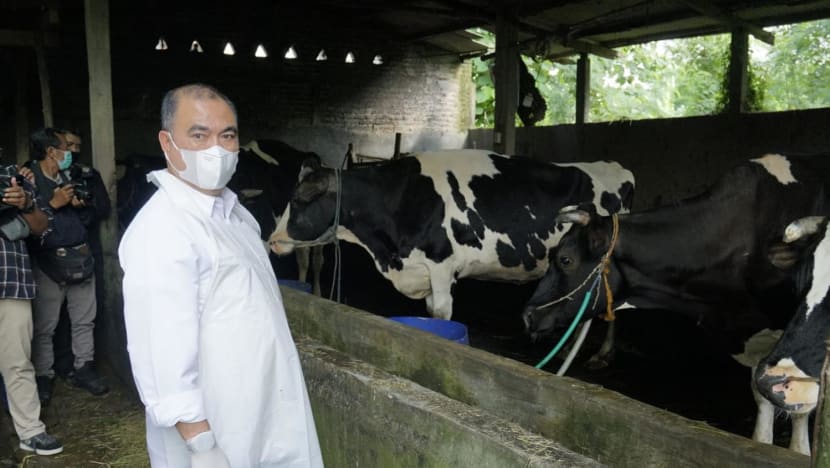Travellers leaving Bali to undergo disinfection amid outbreak of foot and mouth disease among livestock
There has been concern, including from Australia, that travellers may spread the virus when they depart Indonesia.

The Indonesian government started mass vaccination of foot and mouth disease in East Java on June 14, 2022. (Photo: Indonesian Agriculture Ministry)
JAKARTA: Travellers who are leaving Bali will undergo disinfection to ensure that they do not spread foot and mouth disease (FMD) amid an outbreak among livestock in Indonesia, said Minister for Agriculture Syahrul Yasin Limpo.
Speaking to reporters alongside his Australian counterpart Murray Watt on Thursday (Jul 14) in Jakarta, Mr Limpo noted that Bali had earlier recorded FMD cases.
However, he claimed that the outbreak has been successfully contained in Bali and there are no FMD cases there now.
He added that the province had managed to contain FMD by slaughtering animals that were infected.
To ensure that Bali remains free from FMD, the authorities will be disinfecting travellers, said Mr Limpo.
“There will be disinfecting gates at the entrance and exit from Bali by air, and through the port.
“There is even a corridor where a person has to step on with his shoes. (The floor) contains disinfectant … not only for Balinese, not only for Australians but for all who enter it,” Mr Limpo told reporters.
He added that disinfection is also being carried out in other places according to the technical recommendations of experts, including at farms.
Indonesia is currently struggling to contain FMD among livestock and has recorded more than 360,000 cases in 22 out of 34 provinces as of Thursday. More than 2,400 animals have died since the outbreak occurred in late April.
It is currently the winter holiday season in Australia and tourists are again flying to Bali as COVID-19 curbs have been eased. This has sparked concern in Australia that travellers might bring the virus home, potentially impacting the agriculture industry there.
According to Australian media reports earlier this week, the Australian farmers federation has urged travellers to buy new footwear after their holiday, so that they would not inadvertently bring the virus into Australia.
Australia is a major beef exporter. The Australian Bureau of Agricultural and Resource Economics and Sciences (ABARES) has noted that a widespread FMD outbreak in Australia may have an estimated direct economic impact of around A$80 billion (US$54 billion).
On Thursday, Mr Watt said that Australia shares Indonesia’s concern regarding the FMD outbreak.
“This is a very serious disease. And it is in all of our interests both in Indonesia and Australia to help Indonesia manage the outbreak, which they are already doing,” he said.
He said that Australia will give Indonesia one million doses of FMD vaccines. They will be delivered in early August.
The Australian minister also pledged to spend A$500,000 on an industry partnership programme. This will focus on training regarding the management of FMD in feedlots in Indonesia.
”We are very determined to ensure that this outbreak does not reach Australia. It’s not just for our self-interest but also assisting our friends in Indonesia … we want to lend a hand,” said Mr Watt.
FMD is a highly contagious viral disease of livestock that has a significant economic impact, according to the World Organisation for Animal Health (WOAH).
It is not to be confused with hand, foot, and mouth disease found in humans.
FMD affects cattle, swine, sheep, goats and other cloven-hoofed ruminants.
Animals infected by the disease typically show signs of fever followed by blisters between the toes and on the heels, mammary glands and the lips or tongue, disabling them from walking or standing, feeding and eating, the WOAH says.
In general, FMD is not readily transmissible to humans but they can become carriers and the virus can stay on people’s clothes and footwear.
















